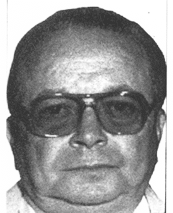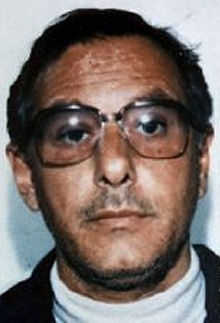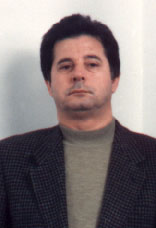Related Research Articles

Vincent Louis Gigante, also known as "The Chin", was an American mobster who was boss of the Genovese crime family in New York City from 1981 to 2005. Gigante started out as a professional boxer who fought in 25 matches between 1944 and 1947. He then started working as a Mafia enforcer for what was then the Luciano crime family, forerunner of the Genovese family. Gigante was one of five brothers; three of them, Mario, Pasquale, and Ralph, followed him into the Mafia. Only one brother, Louis, stayed out of the crime family, instead becoming a Catholic priest. Gigante was the shooter in the failed assassination of longtime Luciano boss Frank Costello in 1957. In 1959, he was sentenced to seven years in prison for drug trafficking, and after sharing a prison cell with Costello's rival, Vito Genovese, Gigante became a caporegime overseeing his own crew of Genovese soldiers and associates who operated out of Greenwich Village.

The Gambino crime family is an Italian-American Mafia crime family and one of the "Five Families" that dominate organized crime activities in New York City, within the nationwide criminal phenomenon known as the American Mafia. The group, which went through five bosses between 1910 and 1957, is named after Carlo Gambino, boss of the family at the time of the McClellan hearings in 1963, when the structure of organized crime first gained public attention. The group's operations extend from New York and the eastern seaboard to California. Its illicit activities include labor and construction racketeering, gambling, loansharking, extortion, money laundering, prostitution, fraud, hijacking, and fencing.

The Genovese crime family, also sometimes referred to as the Westside, is an Italian-American Mafia crime family and one of the "Five Families" that dominate organized crime activities in New York City and New Jersey as part of the American Mafia. They have generally maintained a varying degree of influence over many of the smaller mob families outside New York, including ties with the Philadelphia, Patriarca, and Buffalo crime families.

Aniello John "Neil" Dellacroce was an American mobster and underboss of the Gambino crime family. He rose to the position of underboss when Carlo Gambino moved Joseph Biondo aside. Dellacroce was a mentor to future Gambino boss John Gotti.

Peter Arthur Gotti was an American mobster. He was the boss of the Gambino crime family, part of the American Mafia, and the elder brother of the former Gambino boss John Gotti.
Richard V. Gotti is an American mobster in the Gambino crime family.
John "Jackie" D'Amico is a New York City mobster and caporegime who served as street boss of the Gambino crime family from 2005 to 2011. "Street boss" had been the family's number one position ever since official Boss Peter Gotti started serving a life sentence in prison.
Domenico Cefalù is an Italian-American mobster and is currently the boss of the Gambino crime family in New York City, since July 2011.

Vittorio "Little Vic" Amuso is an American mobster and the boss of the Lucchese crime family. He was described as "The Deadly Don" by Assistant United States Attorney Charles Rose. Amuso's reign is considered one of the bloodiest periods in American Mafia history during the late 1980s and early 1990s, alongside his former underboss and close protégé Anthony Casso, who turned informer against him in 1994. Since the death of Colombo crime family boss Carmine Persico in March 2019, Amuso is currently the longest-serving crime family boss of the Five Families and American Mafia, dating back to 1987. Amuso has been serving a life sentence since 1992 and is currently located at the Federal Correctional Complex, Butner, in North Carolina, on murder and racketeering charges.
Michael DiLeonardo is a former Italian-American mobster who rose to position of caporegime in the Gambino crime family. In the early 2000s DiLeonardo turned government witness and decided to cooperate with the FBI and managed to convict over 80 mobsters. He was temporarily in a witness protection program.

Louis Anthony "Bobby" Manna, is an American mobster and former consigliere of the Genovese crime family operating with the family's New Jersey faction.
Thomas Francis Gambino is an Italian-American New York City mobster and a longtime caporegime of the Gambino crime family who successfully controlled lucrative trucking rackets in the New York City Garment District. He is the son of Carlo Gambino and nephew of Paul Castellano.

Joseph Armone, also known as "Joe Piney" and "Shorty", was an American mobster in the Gambino crime family of New York City who served as underboss between 1986 and 1990, and consigliere from 1990 until his death in 1992.

James "Jimmy Brown" Failla was an American mobster who was a high ranking caporegime with the Gambino crime family and a major power in the garbage-hauling industry in New York City. Failla's crew was based in Brooklyn, with operations stretching into Staten Island, Manhattan, and New Jersey.
Joseph "Jo Jo" Corozzo, Sr. is a New York mobster who was the reputed consigliere of the Gambino crime family.
George "Big Georgie" DeCicco was a New York mobster and longtime captain in the Gambino crime family. DeCicco is one of the last captains of the old John Gotti administration in the 1980s who have not been under any indictment until now. DeCicco is the brother of former Gambino underboss Frank DeCicco, who was killed in a car-bomb meant for his boss John Gotti, ordered by then boss of the Genovese crime family who is now deceased, Vincent "Chin" Gigante, and Lucchese crime family leaders Vittorio "Vic" Amuso and Anthony "Gaspipe" Casso as revenge for the murder of former Gambino crime family boss, Paul Castellano, a strong ally of both the Genovese and Lucchese crime families.

John "Johnny Boy" D'Amato was an American mobster and former acting boss of the DeCavalcante crime family in New Jersey from 1990 to 1992. D'Amato was a prominent made man of the DeCavalcante family and appointed head by Giovanni Riggi under the influence of Gambino crime family boss John Gotti. D'Amato was suspected of engaging in homosexual activity and assassinated in Brooklyn in January 1992.

The Lucchese crime family is an Italian-American Mafia crime family and one of the "Five Families" that dominate organized crime activities in New York City in the United States, within the nationwide criminal phenomenon known as the American Mafia. Members refer to the organization as the Lucchese borgata; borgata is Mafia slang for criminal gang, which itself was derived from a Sicilian word meaning close-knit community. The members of other crime families sometimes refer to Lucchese family members as "Lukes".

Giovanni "John" Gambino was an Italian-born American mobster. Born in Palermo, Sicily, he became a made member of the Gambino crime family in 1975 and a capodecina or captain, and head of the crime family's Sicilian faction, appointed by family boss John Gotti in 1986, according to Mafia turncoat Sammy Gravano.
The Genovese crime family's New Jersey faction is a group of Italian-American mobsters within the Genovese crime family who control organized crime activities within the state of New Jersey. The New Jersey faction is divided into multiple crews each led by a different caporegimes who oversees illegal criminal activities in labor racketeering, illegal gambling, loansharking and extortion. Since the prohibition era the Genovese family's New Jersey faction has maintained a strong presence in the Northern Jersey area. A number of members within the New Jersey faction like Guarino "Willie" Moretti, Gerardo "Jerry" Catena and Louis "Bobby" Manna held positions within the administration of the Genovese family. From the 1990s until his death in 2010, Tino "the Greek" Fiumara was one of the most powerful caporegimes in the New Jersey faction.
References
- ↑ "Samuel" Little Sammy" Corsaro" Archived 2006-12-23 at the Wayback Machine Gangsters Inc.
- ↑ The Soprano State: New Jersey's Culture of Corruption by Bob Ingle, Sandy McClure, pg 244
- 1 2 < "Former Gotti Crime Associate Dies". The New York Times. July 8, 2002
- ↑ "15 Reputed Mob Associates are Indicted in New Jersey". The New York Times. April 22, 1989
- 1 2 "Six Convicted in Mob Case Despite Fear of Tampering". The New York Times. March 7, 1993